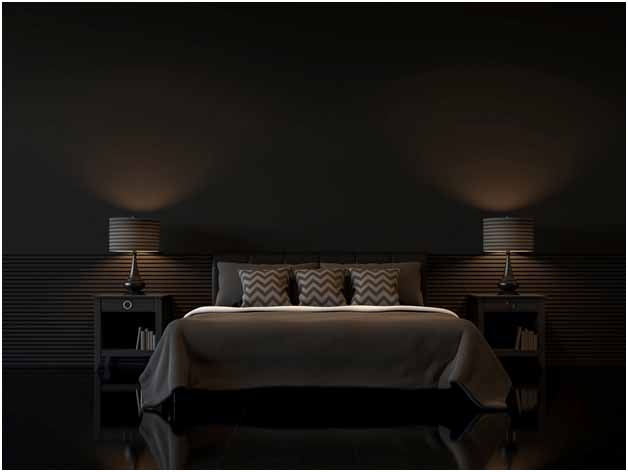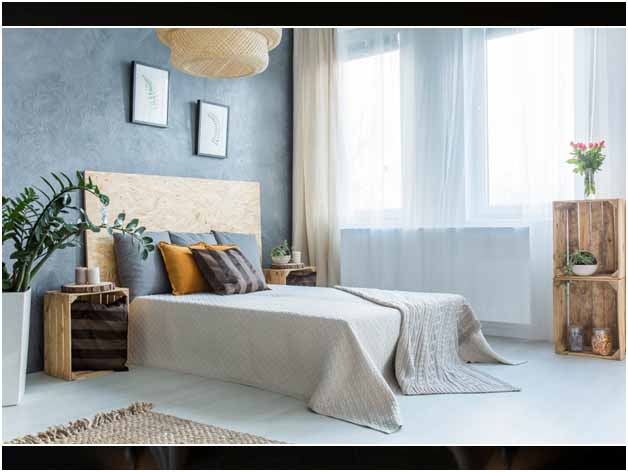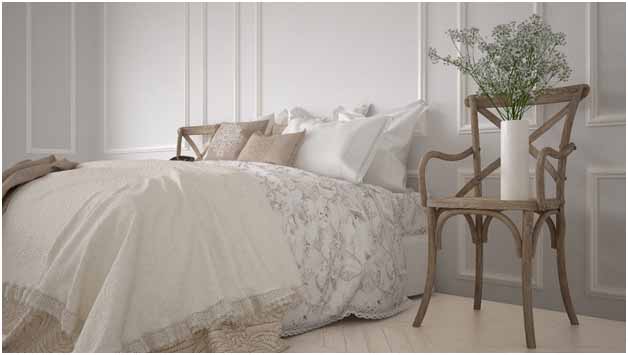As homeowners, we focus on bedroom décor and color, but have you thought about the ways you can improve your bedroom to improve your sleeping habits? If you struggle with falling asleep at the end of the day, your bedroom is a great place to start if you want to improve.
From cleaning up to picking the best bedroom colors for sleep, a few little changes can make a big difference. Start creating the ideal bedroom with these dreamy ideas.

An Ideal Bedroom For Sleep
More than ever, homeowners are focused on creating a beautiful and healthy home. This approach means that we’re looking at rooms in a more practical way than ever before and incorporating decorative items with purpose. For example, houseplants not only look great, but they help to keep the air clean. This approach can also be used in the bedroom to improve your sleep quality. Many of the changes to make don’t take a lot of time but can influence how you fall asleep at night. Here are a few ideas to improve your bedroom:
- Choose the best bedroom paint color
- Clean your bedroom
- Incorporate Feng Shui
- Use essential oils
- Invest in quality sheets
- Block out light
- Keep your room cool

Choose Best Bedroom Colors For Sleep
If you’re ready for a bigger bedroom change to help you sleep better at night, consider changing the paint color. Bright colors tend to be overwhelming and can stimulate your thinking. Stick to muted cool colors in the bedroom to help you relax. A personal favorite of mine is a soft lavender to help me drift off to sleep at night. Keep in mind, the average cost to paint a home interior is $1,679.
Clean Your Bedroom
You might not realize it, but keeping your bedroom clean can actually help promote a better quality of sleep. Not only does it help keep dust and other allergens out while you sleep, but it frees you from distraction and allows you to relax. In fact, cleaning starts with making the bed every morning. According to a study by the National Sleep Foundation, those who make their bed in the morning were 19% more likely to get better sleep. Time to add this to your morning routine!

Incorporate Feng Shui
With a focus on home wellness, many are turning to the benefits of Feng Shuihas in the home. This ancient practice speaks of arranging items in a way to stimulate the mind, body and soul. The bedroom is a great place to start incorporating Feng Shui. Two practices you can easily do is having the bed accessible from all sides and avoiding placing it across from the door. To achieve better sleep, Feng Shui also suggests that you sleep towards the north for better sleep, if possible.
Use Essential Oils
If you’re looking to promote better sleep in your bedroom, investing in a few essential oils and a diffuser can help. Lavender is an oil you can use for many things, but it’s known mainly for its relaxation benefits to aid in sleep. You can diffuse it or use topically before going to bed.
Creating a pillow spray is another way to get the sleep benefits of essential oils. See this tutorial from Wellness Mama on how you can make your own.
Invest In Quality Sheets
While you likely know that the mattress you have impacts your quality of sleep, did you know that your sheets can do the same? Rough sheets that are uncomfortable or heavy material that doesn’t breathe at night can negatively impact your sleep through the night. Look for sheets with a high thread count and are temperature regulated. Bamboo or microfiber sheets are best when it comes to quality. Don't forget to clean these regularly as well!
Block Out Light
Have you ever noticed that a small light can keep your attention all night? Make sure you’ve covered up any light source that you have. If you have an alarm clock, make sure it has a night light feature, so it doesn’t distract you at night. Blackout curtains are a great window treatment choice to help block light coming in from the outdoors.
Blocking out light also includes blue light from your phone or tablet. Make your bedroom an electronic free zone by keeping your phone out of reach. You may also want to stop using your phone or tablet about an hour before bed so you have some time to wind down from the busy day.
Keep Your Room Cool
Temperature has a lot to do with our sleep quality. The ideal room temperature for sleep should be between 60 and 67 degrees, according to Sleep.org. This is because your body temperature changes as you begin to sleep, and a cool environment will help facilitate that.
While keeping cool in the winter is easy, the summertime makes it difficult, especially if you have a bedroom on the second floor. Make sure your air conditioner is well maintained and is able to produce enough cool air. You may also consider a ceiling fan to help cool down your bedroom. The average cost to install a ceiling fan is $230, with most homeowners spending between $166 and $248.
Conclusion
If you’re ready to not just make your home beautiful but restful as well, try incorporating a few of these small ideas into your bedroom. Trying one or two may mean many nights of great sleep!



















Your Message